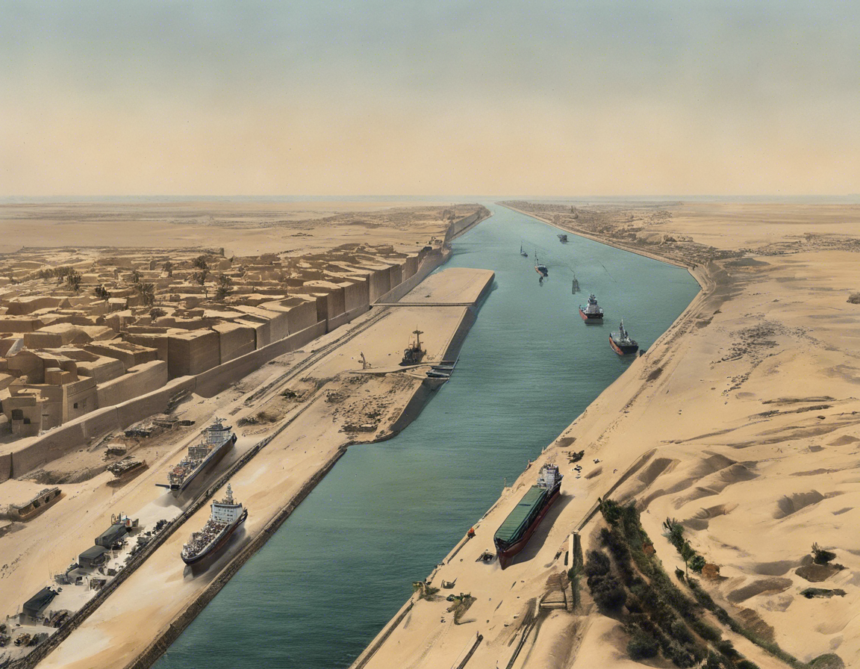Introduction
The Suez Canal, one of the most significant waterways in the world, has played a crucial role in global trade and maritime transportation for over a century. Connecting the Mediterranean Sea to the Red Sea, this man-made canal provides a vital shortcut between Europe and Asia, saving ships thousands of kilometers on their journey. In this comprehensive guide, we will delve into the history, significance, and operation of the Suez Canal.
History of the Suez Canal
-
Construction: The idea of a canal linking the Mediterranean and Red Seas dates back to ancient times. However, it was not until the mid-19th century that the construction of the Suez Canal began. Initiated by the French diplomat Ferdinand de Lesseps, the canal was opened in 1869 after ten years of excavation work.
-
Colonial Era: During the colonial period, control of the Suez Canal became a strategic imperative for European powers. The British, who had acquired a significant stake in the canal company, effectively controlled the waterway as it provided a crucial trade route to their colonies in Asia and Africa.
-
Nationalization: In 1956, the Egyptian President Gamal Abdel Nasser nationalized the Suez Canal, leading to the Suez Crisis. This event marked a turning point in the geopolitics of the region, with the United States and the Soviet Union intervening to defuse the crisis.
-
Expansion: In recent years, the Suez Canal has undergone significant expansion and modernization to accommodate larger vessels and increased maritime traffic. The New Suez Canal, opened in 2015, has widened and deepened the waterway, allowing for smoother passage of ships.
Significance of the Suez Canal
-
Key Trade Route: The Suez Canal is a crucial link in global trade, providing a direct route between Europe and Asia. It allows ships to avoid the lengthy and perilous journey around the southern tip of Africa, saving time and fuel costs.
-
Economic Impact: The revenue generated from tolls on ships passing through the canal is a significant source of income for Egypt. The canal also plays a vital role in the country’s economy by supporting industries such as shipping, logistics, and tourism.
-
Geopolitical Importance: Control of the Suez Canal has been a contentious issue throughout history. Its strategic location makes it a valuable asset for countries seeking to exert influence in the Middle East and beyond.
-
Environmental Concerns: The Suez Canal poses environmental risks, including the introduction of invasive species from ballast water discharged by ships. Efforts are being made to mitigate these challenges and protect the delicate ecosystem of the surrounding region.
Operation of the Suez Canal
-
Tolls and Fees: Ships passing through the Suez Canal are required to pay a toll based on factors such as size, cargo, and draft. These fees contribute to the maintenance and operation of the waterway.
-
Convoy System: To ensure safe and efficient passage of ships through the canal, a convoy system is employed. Vessels are grouped together and guided by pilot boats to navigate the narrow channel.
-
Navigation: Navigating the Suez Canal requires precision and expertise due to its narrow width and shallow depth. Pilots familiar with the canal’s specific challenges are often employed to assist ship captains.
-
Challenges: The Suez Canal faces challenges such as congestion, piracy threats, and political unrest in the region. Efforts are ongoing to address these issues and improve the efficiency of operations.
Future of the Suez Canal
-
Digitalization: With advances in technology, the Suez Canal is embracing digitalization to streamline operations and enhance efficiency. Tools such as real-time tracking and electronic documentation are being implemented to improve the experience for ships transiting the canal.
-
Expansion Projects: Plans are underway to further expand the capacity of the Suez Canal to accommodate larger vessels and increase traffic volume. These projects aim to cement the canal’s position as a vital artery of global trade.
-
Sustainability: In line with global efforts to promote sustainable practices, the Suez Canal Authority is focused on minimizing the environmental impact of canal operations. Initiatives such as eco-friendly dredging techniques and wildlife conservation programs are being implemented.
FAQs
- How long does it take for a ship to transit the Suez Canal?
-
The average transit time through the Suez Canal is around 11-16 hours, depending on factors such as ship size, speed, and traffic.
-
What are the main challenges faced by ships navigating the Suez Canal?
-
Ships transiting the Suez Canal encounter challenges such as strong currents, narrow passages, and the need for precise navigation due to the canal’s shallow depth.
-
How much revenue does Egypt generate from the Suez Canal?
-
The Suez Canal contributes significantly to Egypt’s economy, generating billions of dollars in revenue annually from tolls and related services.
-
Are there any restrictions on the types of ships that can pass through the Suez Canal?
-
The Suez Canal has restrictions on ship size, draft, and cargo types for vessels transiting the waterway. Ships exceeding these limits may require special permission or modifications.
-
What role does the Suez Canal play in global trade patterns?
- The Suez Canal is a key artery of global trade, facilitating the movement of goods between Europe, Asia, and beyond. It has a significant impact on trade routes and shipping logistics worldwide.
In conclusion, the Suez Canal continues to be a vital artery of global trade, connecting continents and facilitating the movement of goods and people. Through its rich history, strategic significance, and ongoing modernization efforts, the canal remains a symbol of human ingenuity and cooperation in overcoming geographical barriers.


Leave a Reply